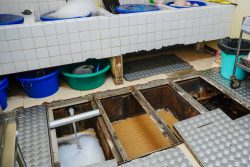What Happens If A Grease Trap Isn’t Cleaned
 What Happens If A Grease Trap Isn’t Cleaned
What Happens If A Grease Trap Isn’t Cleaned
A grease trap is a plumbing device that is designed to capture fat, oil, and grease (FOG) from commercial kitchens before it enters the wastewater system. When a grease trap isn’t cleaned regularly, it can cause a variety of issues for your plumbing system, business, and the environment. In this blog post, we’ll explore the consequences of not cleaning a grease trap and what you can do to avoid these issues.
1. Plumbing Backups
One of the immediate consequences of not cleaning a grease trap is plumbing backups. Without regular cleaning, the grease trap becomes overloaded with FOG, which can prevent water from flowing through the pipes properly. This is often seen in the form of clogged sinks and drains, slow-flowing water, and even toilets that won’t flush.
Backups can be quite unpleasant and cause significant inconvenience to your customers and employees. In addition to this inconvenience, plumbing backups require costly repairs, and your business may have to shut down for a day or two while the repairs are being made.
2. Fines and Penalties
Failing to clean your grease trap can lead to penalties and fines from your local water and sewer agency. Most local governments have regulations in place requiring commercial kitchens to have accessible and professionally cleaned grease traps to prevent FOG build-up in their plumbing systems.
If your business is found to be in violation of these regulations, you will be subject to fines and penalties, which can be quite expensive and damaging to your business’s reputation.
3. Damage to Sewer Pipes
FOG build-up is harmful to pipes. Grease and oil can cling to the inside of pipes and create blockages, causing the pipes to degrade and erode over time. If grease blockages are not resolved, they can cause damage to the pipes and eventually require costly repairs and replacement.
4. Environmental Damage
When FOG enters the wastewater system, it can cause significant harm to the environment. FOG can coat the inside of pipes and sewer lines, reducing the flow of wastewater. When this occurs, untreated wastewater can escape into the environment, potentially contaminating water sources and polluting waterways.
Untreated wastewater can also contain harmful bacteria and pathogens that can be harmful to humans and wildlife. It is essential to ensure that your grease trap is cleaned regularly to prevent FOG build-up and protect the environment.
5. Bad Odors
When FOG builds up in your grease trap, it begins to decompose, which can lead to unpleasant odors. In addition to being unpleasant, these odors can be a turn-off for potential customers and can even worsen over time if not resolved. Over time, these bad odors can even lead to respiratory problems in employees who work in the kitchen.
Preventive Measures
The best way to avoid these issues is to schedule regular grease trap cleaning. Regular cleaning will reduce FOG build-up and prevent blockages from forming in your plumbing system. Another preventive measure is to implement proper cleaning practices in your kitchen, such as scraping plates and pans before washing them in the sink and avoiding pouring FOG down the drain.
Final Thoughts
A grease trap is essential in any commercial kitchen as it prevents FOG from entering the wastewater system. Failing to clean the grease trap regularly can cause plumbing backups, fines and penalties, damage to sewer pipes, environmental damage, and unpleasant odors. It is crucial to schedule regular grease trap cleaning to avoid these issues and comply with local regulations. By doing so, you can prevent costly repairs, maintain a healthy environment, and protect your business’s reputation.
Interested in scheduling a cleaning for your grease trap? Be sure to contact our team of grease trap specialists here at Safeway Used Oil and Grease to learn more about what we can do for you! Call us today!
Categorised in: Grease Trap Cleaning

 What Happens If A Grease Trap Isn’t Cleaned
What Happens If A Grease Trap Isn’t Cleaned